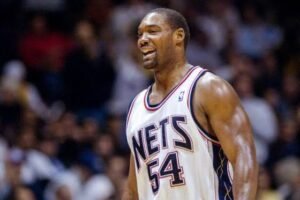
Introduction

Rodney Rogers was more than just a talented basketball player — he was a symbol of strength, perseverance, and grace. From his standout years at Wake Forest University to a successful 12-season NBA career, and later his life-altering paralysis, his journey is both inspiring and tragic. This article explores his life, career, the accident that changed everything, and his legacy.
Early Life and Rise at Wake Forest
Rodney Ray Rogers Jr. was born on June 20, 1971, in Durham, North Carolina. He grew up with a love for sports and quickly made a name for himself in high school. His combination of athleticism, strength, and skill earned him the nickname “Durham Bull.”
College Career Highlights
-
Wake Forest University: Rogers attended Wake Forest for three seasons.
-
ACC Rookie of the Year (1991): He made an immediate impact in his freshman year.
-
ACC Player of the Year (1993): In his junior year, he averaged roughly 21.2 points per game and 7.4 rebounds.
-
All-American: His performance at Wake earned him national recognition.
-
Jersey Retired: Wake Forest honored him by retiring his No. 54 jersey.
His success in college set the stage for a promising professional career. He was not just physically imposing, but had a versatile game — able to score, rebound, and play with energy and heart.
NBA Career
Rogers entered the NBA as a high-profile prospect after his junior year.
-
Draft: He was selected 9th overall in the 1993 NBA Draft by the Denver Nuggets.
-
Teams: Over his 12-year NBA career, he played for seven different teams — including the Nuggets, Los Angeles Clippers, Phoenix Suns, Boston Celtics, New Jersey Nets, New Orleans Hornets, and Philadelphia 76ers.
-
Career Averages: He averaged about 10.9 points and 4.5 rebounds per game in the NBA.
-
Sixth Man of the Year (2000): One of his most memorable achievements came during his stint with the Phoenix Suns, when he won the NBA Sixth Man of the Year award in the 1999–2000 season.
-
Playoff Highlights: He also had playoff runs, most notably with the New Jersey Nets, who reached the Finals in 2003.
Rogers was known for his physical style, scoring ability, and the energy he brought even when coming off the bench.
What Happened to Rodney Rogers? The Accident and Injury
The ATV Crash
On November 28, 2008, Rodgers was involved in a tragic all-terrain vehicle (ATV) accident in Vance County, North Carolina. The accident occurred while he was riding on a trail; he drove into a ditch, lost control, and the vehicle flipped over.
The Severity of the Injury
-
Spinal Cord Injury: The crash caused a spinal cord injury.
-
Paralysis: He was paralyzed from the shoulders down.
-
Medical Transfer: Initially taken to Duke University Medical Center; later moved to the Shepherd Center in Atlanta, a facility specialized in spinal cord and brain injury rehabilitation.
-
Prognosis: At the time, he was given only a 5% chance of ever walking again.
His life changed forever in that moment. The vibrant athlete who once powered through basketball games now faced a new, grueling challenge. Rodney Rogers injury.
Life After the Accident: Courage and Resilience
Despite the devastation, Rodney Rogers did not give up. His response to his paralysis was marked by remarkable strength and positivity.
Foundation and Advocacy
-
Rodney Rogers Foundation: He launched a foundation to support individuals with spinal cord injuries, advocating for resilience, hope, and community support.
-
Public Inspiration: Even from a wheelchair, he remained a symbol of perseverance. His story inspired many, and he never shied away from sharing his journey.
Recognition and Legacy
-
Distinguished Alumni Award: Wake Forest honored him with this award in 2022, celebrating not just his athletic greatness but his character and impact.
-
Death and Cause: On November 21, 2025, Rodney Rogers passed away at age 54. According to his family and the NBPA, his death was due to natural causes linked to his spinal cord injury.
-
Tributes: Coaches, teammates, and fans remembered him not only as a basketball star but as a kind, caring human being. Rodney Rogers injury.
The Impact on Wake Forest & Basketball
Rodney Rogers remains one of the most iconic figures in Wake Forest basketball history.
-
On-Court Legend: His scoring, physicality, and leadership left a lasting mark on Demon Deacons basketball.
-
Role Model: His life after injury turned him into a role model for many — showing that adversity can be met with dignity, strength, and purpose.
-
Community Builder: Through his foundation, he continued to help others with spinal injuries, reinforcing a message of giving back.
-
Legacy Beyond Stats: While his NBA numbers are impressive, the legacy he built off-court — resilience, humility, and heart — perhaps resonates even more deeply. Rodney Rogers injury.
What Happened to Him — Summary Points
-
Rising star at Wake Forest — ACC Rookie of the Year (1991), Player of the Year (1993)
-
Drafted 9th overall in 1993, 12-year NBA career across 7 teams.
-
Won NBA Sixth Man of the Year in 2000 with Phoenix Suns.
-
ATV accident in 2008 left him paralyzed from the shoulders down.
-
Created a foundation for spinal cord injury awareness.
-
Died in 2025, due to complications from his spinal injury. Rodney Rogers injury.
FAQs (Frequently Asked Questions)
-
Who was Rodney Rogers?
Rodney Rogers was a star basketball player at Wake Forest University and a 12-season NBA veteran. -
Why is he called the “Durham Bull”?
The nickname came from his hometown (Durham, NC) combined with his powerful, bull-like strength on the court. -
What happened to Rodney Rogers in 2008?
He was involved in a serious ATV accident, which caused a spinal cord injury and left him paralyzed from the shoulders down. -
Did he recover from his paralysis?
He did not regain full mobility; he lived his life with the injury and used his experience to help others through his foundation. -
When and how did Rodney Rogers die?
He passed away on November 21, 2025, from natural causes related to his long-term spinal cord injury. -
What is the Rodney Rogers Foundation?
A foundation he set up to support people with spinal cord injuries, offering hope, advocacy, and connection. -
What are his major basketball accomplishments?
-
ACC Rookie of the Year (1991)
-
ACC Player of the Year (1993)
-
NBA Sixth Man of the Year (2000)
-
12 seasons in the NBA playing for seven different teams
-
Conclusion
Rodney Rogers’s life was a testament to resilience. From a breakout star at Wake Forest to an impactful NBA career and then navigating life after a debilitating injury, his journey was never easy — yet he embraced it with dignity and determination.
His legacy goes beyond the basketball court: through his foundation, his courage, and his unwavering spirit, he continues to inspire. As we remember him, it’s not just for the points he scored or the awards he won, but for the strength he showed in the toughest times.
Rodney Rogers will always remain a true hero in the world of basketball and, more importantly, in life.
